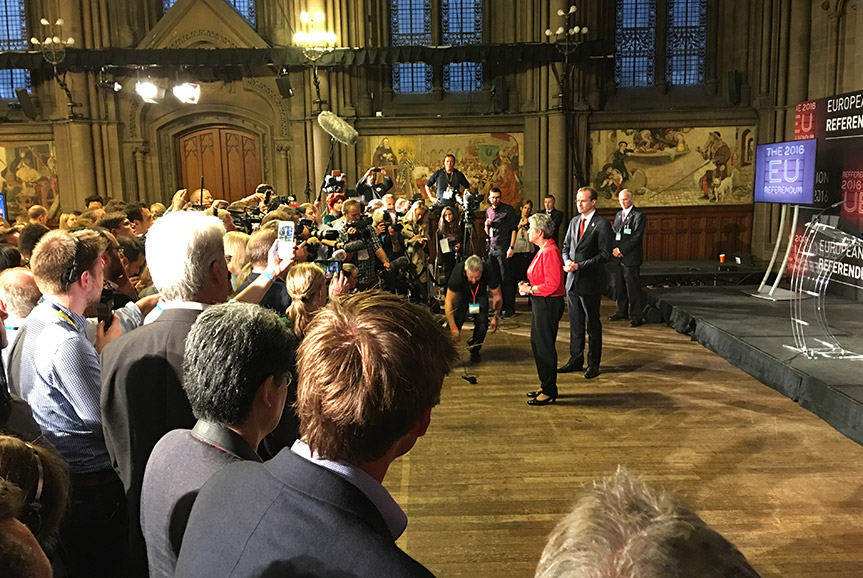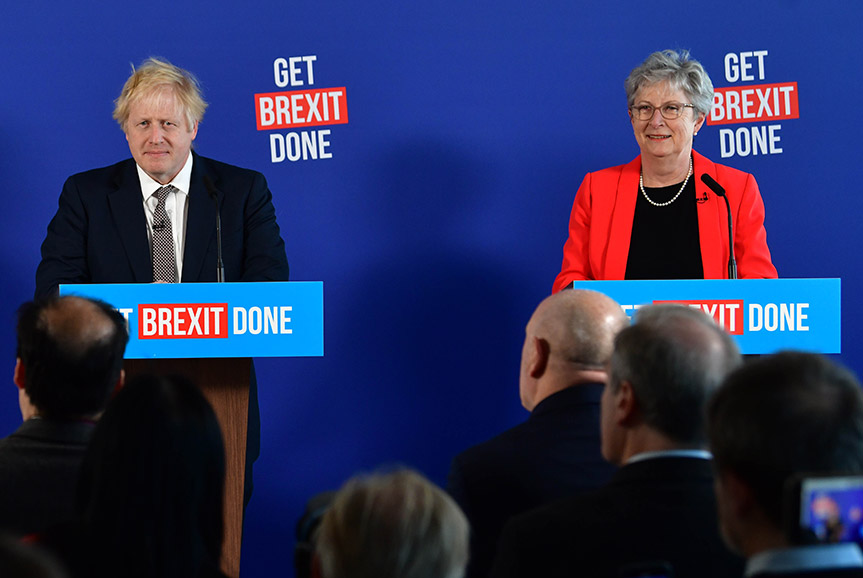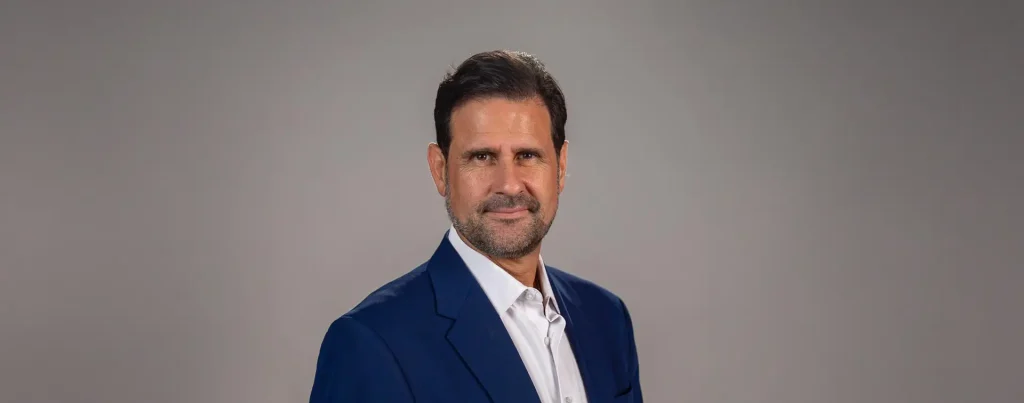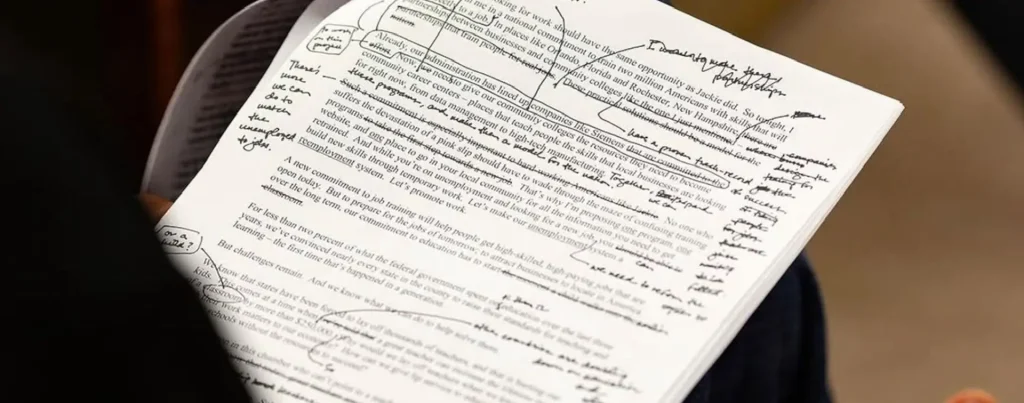@GiselaStuart
«The next big challenge is for England to fight for the United Kingdom to remain intact»
Por José Luis Izaguirre, @jl_izaguirre92
Former member of the British Labour Party, she was a Member of Parliament for Birmingham Edgbaston from 1997 until 2017. During the Brexit referendum, Stuart was Stuart was Chair of the Vote Leave Campaign Committee. After she left Parliament, Stuart was appointed in 2018 as Chair of Wilton Park, an executive agency of the UK Foreign Office dedicated to conflict resolution in international relations.

Stuart is a member of the Steering Committee of the Constitution Reform Group, a cross-party organization that seeks a new constitutional settlement in the UK by way of a new Act of Union.
During the Brexit referendum campaign, you were one of the strongest advocates for leaving the European Union. This is be a very complicated question to answer in a few sentences, but why do you think the UK is better off out of the European Union?
This was a vote about what system of government the British people wanted. When the UK joined what was then known as the Common Market in 1973 it made a big decision. Rather than relating to its neighbours purely through trade [as it did through EFTA] it chose to join an organisation which always had as its stated aim deeper political integration, albeit through economic means. The second big decision which continued to have consequences where the “opt-outs” negotiated by John Major’s government with the Maastricht Treaty in the 1990s. The UK would not join the Single Currency and it would not be part of the common travel area known as Schengen. These were the beginnings of a “two speed Europe”, but one where it was possible to still assume a common destination, albeit one achieved at a different pace. Once the euro was introduced and the UK showed no intentions of joining it, the question of a “two destination” Europe became acute. If David Cameron had negotiated a deal with the EU which would have constructed two kinds of EU membership – those with a single currency and those who kept their national currency, as of right – not just an opt out – I would have said “let’s give it a try.
The euro-countries will need deeper political integration and countries like the UK will need to establish close trading relationships, but one where the British parliament and British courts have the last word on laws, taxes and borders
For me it was not an economic question, but one of democratic accountability and checks and balances. I believe that democracies deliver economic prosperity, not the other way round. That means that the euro-countries will need deeper political integration and countries like the UK will need to establish close trading relationships, but one where the British parliament and British courts have the last word on laws, taxes and borders.
How difficult was it politically to defend your position within the Labour Party?
My colleagues in parliament respected my decision to campaign for Leave. They were surprised that I chose to lead the official Leave campaign, but they were not surprised that I supported Leave. I had taken a different view from the mainstream of the Labour Party after I had been part of the Convention on the Future of Europe. The real unpleasantness for me did not start until after the referendum, and that came largely from people who most of their lives have been used to getting what they wanted. They couldn’t believe that a majority of the British public did not agree with them. The only way they could deal with their disappointment was to brand anybody who voted to Leave as “old, stupid and racist”.
In terms of communication, what would you say were the key elements within the Leave campaign that were stronger than the Remain campaign and that led the race?
The big difference in the campaign was that Leave argued that we should “take back control” and voters should have the final say over who makes their laws, whilst the Remain campaign only made an economic argument. Democracy is about belonging, identity and community. The Remain campaign never understood that.

Four years after the British people decided to leave the European Union, we can state that British politics has changed in terms of dynamics. Brexit and its management still have a great power. Would you agree with this statement? In what was has British politics changed in the last four years?
Many things have changed. Immediately after the referendum the then Prime Minister resigned. The new Prime Minister called a snap general election in 2017, where her majority was reduced. After a period of stalemate another general election in 2019 gave the new Conservative Prime Minister [the third in three years!] a significant majority and the main opposition party suffered a historic defeat.
Democracy is about belonging, identity and community. The Remain campaign never understood that
The Conservative Party for the first time in decades is not divided over Europe. The Labour Party has lost the support of many traditional voters outside large cities and the third party is struggling to define itself. Traditional terms like Left and Right don’t mean much to a whole generation of young voters. The parties of the centre left are still struggling. What is remarkable is how resilient the political institutions have shown themselves.
Do you think there is a real fear in the UK, especially amongst politicians, that due to the tensions originated after Brexit, that national unity is at risk?
The next big challenge is for England to fight for the United Kingdom to remain intact. We talk much about Scotland wanting independence. We should talk more about why it is good for England as well as Scotland, Wales and Northern Ireland to remain part of the United Kingdom.
The Labour Party has lost the support of many traditional voters outside large cities and the third party is struggling to define itself
It is much too early to assess how Covid-19 will affect these debates but I think it will show to the people of these islands that we have more in common than what divides us. I also hope that particularly in England our cities outside London will get more power. Devolution in England, apart from the capital, is very much unfinished business.
During your political career, you have also served as Chair of Wilton Park within the UK Foreign and Commonwealth Office. In terms of foreign policy, what do you think the role of the UK should be now internationally?
It has been honour to be asked to chair the board of Wilton Park, which is an executive agency of the Foreign Office. We are part of the “family” but are also independent. Our main approach has always been to resolve conflict by dialogue. And this function is going to be even more important now than it has been in the past. After the fall of the Berlin Wall and the collapse of the Soviet Union we all assumed that democracies would raise in every part of the world. And even when countries did not quite behave like that, we assumed that they were benign. But this has not happened. The most important thing the UK can do now is help develop the new global institutions we are going to need. The US is not taking the lead. New technologies have brought new threats and our multilateral institutions need to reflect that. With others we need to be global conveners who shape and defend a rules-based world.
After the UK has left the EU, it is now time to negotiate what the relationship between the two parties. Which are the musts for you in this negotiation?
We are friends as well as close partners. We always were and will continue to be European, geographically close as well as sharing values. I was born in 1955 in what was then West Germany and remember a time when the UK was outside the Common Market. The euro countries need deeper political integration and the UK has chosen a different path. That does not make us adversaries. It is in all our interests that our economies are strong. Close co-operation between our universities and research institutions continue for example will continue just as we will work together on defence and security.
How do you see the Labour Party leadership election? Is Jeremy Corbyn an easily replaceable leader?
I still find it hard to understand how the Labour Party ever came to elect Jeremy as its leader. Keir Starmer has a very difficult task on his hands. He has to deal with the antisemitism in the party, recapture the traditional Labour voters outside London and chart a path which would make Labour a party of government again. Centre left parties across Europe are finding this difficult. He has made good appointments to the Shadow Cabinet, but it will be along and uphill struggle.

What are your most memorable moments as a public servant? What are you most proud of?
I shall never forget being in Dresden together with world leaders marking the 10th anniversary of German Unification. And I was there not as a German, the country of my birth, but as a representative of the British government. My mother remembers the skies turning red when Dresden was bombed, just as my mother-in-law remembers the skies turning red when Coventry was bombed.
The most important thing the UK can do now is help develop the new global institutions we are going to need. The US is not taking the lead
In 2015 I was at Buckingham Palace being sworn in as a Privy Councillor by The Queen.
These two events are for me the personal, living examples of how the world can change for the better, as well as a reminder of what an open and welcoming society Britain is.
Which politicians have looked up during your public service and why?
Of living politicians, I still believe that Tony Blair was a remarkable party leader and Prime Minister. We may have parted company over the question of Europe, but I cannot help thinking that if it had not been for Iraq, the EU would have developed differently. Of the politicians of the past, Joe Chamberlain who started his political career in the late 19th century as the mayor of Birmingham, has always been an inspirational figure for me. In the 20 years of being one of the Members of Parliament for the city, I often hoped that we would find a new Joe Chamberlain.





